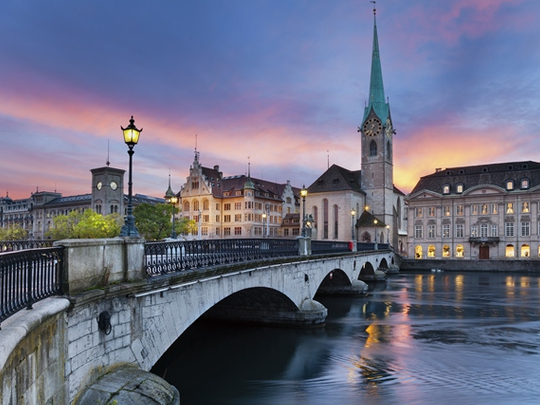
Across the railway lines from central Zürich, Schiffbau, the old shipbuilding yard turned cultural space, houses Switzerland’s largest performing arts centre — the Schauspielhaus jazz clubs and restaurants. Lit up in neon, the classical red brick building is a symbol of the transformation of Zurich, lying at the heart of a vibrant zone of landscaped squares and rejuvenated industrial spaces.
For the past few years, the former industrial district of Zürich-West — Züri West to locals — has been a hotbed of cultural and commercial developments, still in the making. Squished between the Limmat River and Zürich’s central station, its old breweries, rail viaducts and soap factories have been making way for contemporary art centres, apartments, spas, shops and hotels.
Inside the Schiffbau, the restaurant LaSalleis typical of the striking conversions with its soaring ceilings, gritty exposed metal structure and glass walls.
By night, the neighbouring Turbinenplatz — whose name gives away its industrial past — is lit up colourfully, highlighting the stark but aesthetic mix of concrete, glass and greenery. Like much of Züri-West, the space often gives over to festivals and public art — sculptures, installations and colourful fibreglass cows (the now international CowParade, the largest public art event in the world, has its roots in Zürich).
The adjacent Giessereihalle Puls 5 — a former metal foundry — is another fascinating venue housing meeting spaces, a gym, boutiques and eateries. Shop along the 450-metre-long Viaduktstrasse where fashion and jewellery boutiques, delicatessens and bookstores are niched within the arches of a 19th-century railway bridge. Frau Gerolds Garten — an organic garden-cum-restaurant, art gallery, boutique and bicycle air-filling station — nudges the railway lines, its rooftop lounge perching on brightly painted shipping containers. This wacky, wonderful café captures the spirit of Zürich’s renaissance.
The banking capital is seriously chilling out, with a flourish of outdoor music, public partying and futuristic architecture to cap off its stunning alpine and lake setting. Zürich-born hotelier Hans Peter Kaiser believes culture is fuelling the change. “It’s swung from being a stubborn city dominated by a Lutheran mindset to a relaxed and open place,” he says. “We still have the reputation of being a business city, but a lot of growth is being driven by the cultural sector.”
Peter Haerle, Cultural Director at the Zurich City Council, agrees. “The creative sector is the most dynamic of the economy. Since around 2010, it has emerged from the shadow of the banking industry to be a very strong second economic sector.”
Another knock-on effect of the blooming cultural scene is a hotel boom. Back in Zürich-West, the executive rooms of the Renaissance Zürich Tower — located in the modern marvel of the Mobimo Tower — offer enthralling views. Positioning itself as a big boutique hotel, it has a large fitness and wellness area, several restaurants, a sun terrace and executive lounge. It’s a great place to stay to soak up the fresh, exciting feel of this creative, post-industrial zone — and just a zippy tram ride from the city on Zürich’s efficient transport network. The same goes for the 25 Hours Hotel within the riverside plazas and mixed developments of the Turbineplatz. Across the city, the four-star B2 Boutique Hotel sprang up from another redevelopment — the Hurlimann Brewery. Beneath its towering red chimney, the hotel has a fantastic industrial-chic feel — and possibly the most incredible rooftop pool in Europe, with views out over the city and surrounding Alps.


